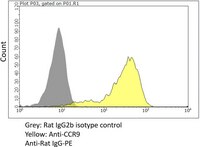MABF2791-100UG Sigma-AldrichAnti-CCR9 Antibody, clone 7E7
Anti-CCR9, clone 7E7, Cat. No. MABF2791, is a rat monoclonal antibody that detects CCR9 and is tested for use in Flow Cytometry, Immunofluorescence, and Immunohistochemistry.
More>> Anti-CCR9, clone 7E7, Cat. No. MABF2791, is a rat monoclonal antibody that detects CCR9 and is tested for use in Flow Cytometry, Immunofluorescence, and Immunohistochemistry. Less<<Recommended Products
Overview
| Replacement Information |
|---|
| References |
|---|
| Product Information | |
|---|---|
| Format | Purified |
| Presentation | Purified rat monoclonal antibody IgG2b in buffer containing 0.1 M Tris-Glycine (pH 7.4), 150 mM NaCl with 0.05% sodium azide. |
| Quality Level | MQ200 |
| Physicochemical Information |
|---|
| Dimensions |
|---|
| Materials Information |
|---|
| Toxicological Information |
|---|
| Safety Information according to GHS |
|---|
| Safety Information |
|---|
| Storage and Shipping Information | |
|---|---|
| Storage Conditions | Recommended storage: +2°C to +8°C. |
| Packaging Information | |
|---|---|
| Material Size | 100 μg |
| Transport Information |
|---|
| Supplemental Information |
|---|
| Specifications |
|---|
| Global Trade Item Number | |
|---|---|
| Catalog Number | GTIN |
| MABF2791-100UG | 04065268363294 |
Documentation
Anti-CCR9 Antibody, clone 7E7 SDS
| Title |
|---|
Anti-CCR9 Antibody, clone 7E7 Certificates of Analysis
| Title | Lot Number |
|---|---|
| Anti-CCR9, clone 7E7 - Q3874335 | Q3874335 |







